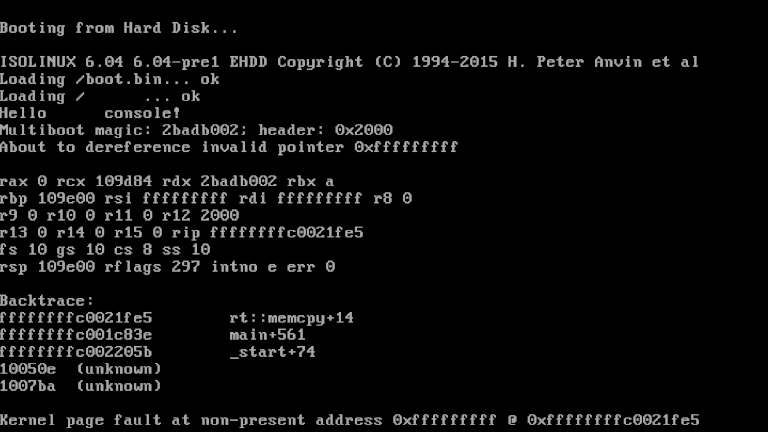Greetings! The weather is starting to warm up again, eh? I’m a bit disappointed that we didn’t get any snow this winter. Yadda yadda insert intro text here. Let’s get down to brass tacks. What’s new this month?
I mainly focused on the programming language this month. I started writing a kernel, which you can see a screenshot of below. This screenshot shows a simulated page fault, demonstrating that we have a working interrupt handler, and also shows something mildly interesting: backtraces. I need to incorporate this approach into the standard library as well, so that we can dump useful stack traces on assertion failures and such. I understand that someone is working on DWARF support as well, so perhaps we’ll soon be able to translate function name + offset into a file name and line number.

I also started working on a PNG decoder this weekend, which at the time of writing can successfully decode 77 of the 161 PNG test vectors. I am quite pleased with how the code turned out here: this library is a good demonstration of the strengths of the language. It has simple code which presents a comprehensive interface for the file format, has a strong user-directed memory management model, takes good advantage of features like slices, and makes good use of standard library features like compress::zlib and the I/O abstraction. I will supplement this later with a higher level image API which handles things like pixel format conversions and abstracting away format-specific details.
Expand for a sample from image::png
use bufio;
use bytes;
use compress::zlib;
use errors;
use io;
export type idat_reader = struct {
st: io::stream,
src: *chunk_reader,
inflate: zlib::reader,
decoder: *decoder,
};
// Returns a new IDAT reader for a [[chunk_reader]], from which raw pixel data
// may be read via [[io::read]]. The user must prepare a [[decoder]] object
// along with a working buffer to store the decoder state. For information about
// preparing a suitable decoder, see [[newdecoder]].
export fn new_idat_reader(
cr: *chunk_reader,
decoder: *decoder,
) (idat_reader | io::error) = {
assert(cr.ctype == IDAT, "Attempted to create IDAT reader for non-IDAT chunk");
return idat_reader {
st = io::stream {
reader = &idat_read,
...
},
src = cr,
inflate = zlib::decompress(cr)?,
decoder = decoder,
};
};
fn idat_read(
st: *io::stream,
buf: []u8,
) (size | io::EOF | io::error) = {
let ir = st: *idat_reader;
assert(ir.st.reader == &idat_read);
let dec = ir.decoder;
if (dec.buffered != 0) {
return decoder_copy(dec, buf);
};
if (dec.filter is void) {
const ft = match (bufio::scanbyte(&ir.inflate)) {
case io::EOF =>
return idat_finish(ir);
case let b: u8 =>
yield b: filter;
};
if (ft > filter::PAETH) {
return errors::invalid;
};
dec.filter = ft;
};
// Read one scanline
for (dec.read < len(dec.cr)) {
match (io::read(&ir.inflate, dec.cr[dec.read..])?) {
case io::EOF =>
// TODO: The rest of the scanline could be in the next
// IDAT chunk. However, if there is a partially read
// scanline in the decoder and no IDAT chunk in the
// remainder of the file, we should probably raise an
// error.
return idat_finish(ir);
case let n: size =>
dec.read += n;
};
};
applyfilter(dec);
dec.read = 0;
dec.buffered = len(dec.cr);
return decoder_copy(dec, buf);
};
fn idat_finish(ir: *idat_reader) (io::EOF | io::error) = {
// Verify checksum
if (io::copy(io::empty, ir.src)? != 0) {
// Extra data following zlib stream
return errors::invalid;
};
return io::EOF;
};
@test fn idat_reader() void = {
const src = bufio::fixed(no_filtering, io::mode::READ);
const read = newreader(&src) as reader;
let chunk = nextchunk(&read) as chunk_reader;
const ihdr = new_ihdr_reader(&chunk);
const ihdr = ihdr_read(&ihdr)!;
let pixbuf: []u8 = alloc([0...], decoder_bufsiz(&ihdr));
defer free(pixbuf);
let decoder = newdecoder(&ihdr, pixbuf);
for (true) {
chunk = nextchunk(&read) as chunk_reader;
if (chunk_reader_type(&chunk) == IDAT) {
break;
};
io::copy(io::empty, &chunk)!;
};
const idat = new_idat_reader(&chunk, &decoder)!;
const pixels = io::drain(&idat)!;
defer free(pixels);
assert(bytes::equal(pixels, no_filtering_data));
};
In SourceHut news, I completed our migration to Alpine 3.15 this month after a brief outage, including an upgrade to our database server, which is upgraded on a less frequent cadance than the others. Thanks to Adnan’s work, we’ve also landed many GraphQL improvements, mainly refactorings and other like improvements, setting the stage for the next series of roll-outs. I plan on transitioning back from focusing on the language to focusing on SourceHut for the coming month, and I expect to see some good progress here.
That’s all I have to share for today. Until next time!